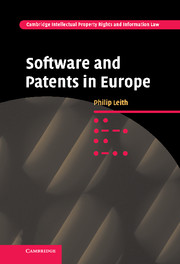Book contents
- Frontmatter
- Contents
- List of figures
- Introduction
- 1 Software as machine
- 2 Software as software
- 3 Policy arguments
- 4 Software patent examination
- 5 Holding the line: algorithms, business methods and other computing ogres
- 6 The third way: between patent and copyright?
- 7 Conclusion: dealing with and harmonising ‘radical’ technologies
- Index
- Cambridge Intellectual Property and Information Law
5 - Holding the line: algorithms, business methods and other computing ogres
Published online by Cambridge University Press: 22 July 2009
- Frontmatter
- Contents
- List of figures
- Introduction
- 1 Software as machine
- 2 Software as software
- 3 Policy arguments
- 4 Software patent examination
- 5 Holding the line: algorithms, business methods and other computing ogres
- 6 The third way: between patent and copyright?
- 7 Conclusion: dealing with and harmonising ‘radical’ technologies
- Index
- Cambridge Intellectual Property and Information Law
Summary
The feature of using technical means for a purely non-technical purpose and/or for processing purely non-technical information does not necessarily confer technical character to any such individual steps of use or to the method as a whole: in fact, any activity in the non-technical branches of human culture involves physical entities and uses, to a greater or lesser extent, technical means.
[With] applications for computer systems for the performance of business methods, therefore, it is essential to give careful and imaginative attention to the question of whether or not it is possible to identify some aspect of the system which can be said to provide a technical effect.
Introduction
If the history of the EPC in its first two decades was that of continual attempts to overcome the software exclusions, then the current developments relating to business methods and algorithms offer a similar future: pushing the conceptual barriers of patentability until they finally stretch too far and break under the force of their lack of coherence. The power to do this lies with the patent attorney profession, who are ‘repeat players’ in the process, with a relatively common goal: responding to their client's demands to extend the protection available for their inventions. The effect upon any examiner trying to ‘hold a line’ which is based on an abstract ideal or definition must be difficult, requiring both strong conceptual and organisational mechanisms.
- Type
- Chapter
- Information
- Software and Patents in Europe , pp. 135 - 155Publisher: Cambridge University PressPrint publication year: 2007



